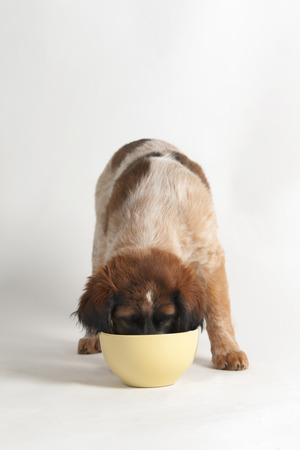What to Feed a Puppy - The Complete Guide for New Pet Parents
November 29, 2024 | By David Jackson

Ask any pawrent and they'll tell you with a misty eye that bringing home a new puppy is one of the most exciting times in your life (as well as terrifying, confusing, and "oh my, I didn't know I could be this tired" inducing).
And while your days are about to be filled cuddles, watching them nap (plus taking endless pictures and videos of them napping), playtime, training and trying your best to stop the inevitable puppy chomps, caring for a young pup involves much, much more especially when it comes to feeding them.
After all, feeding your puppy the right food is crucial for its growth and health.
That said, with so many puppy food options on the market these days, it can be overwhelming to know what to feed a puppy to ensure it gets the proper nutrients.
Well, at All About Dog Food, we want to make choosing food for you puppy a little easier so in this detailed guide, we’ll walk you through everything you need to know about puppy nutrition, from choosing the right food to creating a feeding schedule and a few extra tips and tricks to keep your fur-baby happy, healthy and tail wagging.
Table of Contents
Table of Contents
What to Feed a Puppy - Understanding Puppy Nutrition
 No matter the breed, your puppy will grow at an astonishing rate and have bundles of energy, which is why their nutritional needs are different from those of adult dogs who'd prefer to take an afternoon snooze over playtime.
During the first few months of life, puppies require a diet rich in proteins, fats, and essential nutrients to fuel their development. The right puppy food supports healthy growth, keeps bones strong, promotes a shiny coat, and ensures their organs develop just as they should as they grow.
Key Nutrients Puppies Need
When selecting food for your puppy, it’s important to choose a balanced formula designed specifically for their developmental stage.
You see, puppy food differs from adult dog food in that it contains higher levels of protein, fat, and certain vitamins and minerals to support all that rapid growth they'll be doing. So, when it comes to choosing a good puppy food, make sure it includes the following essential nutrients:
Protein
Puppies need a high-quality source of protein for growth and muscle development. Look for meat-based protein such as beef, chicken, turkey, lamb, or fish. Protein should make up around 20-30% of your puppy's diet.
Fat
Fat is an essential energy source for puppies, and it supports the development of the brain and nervous system. Puppy food should contain at least 8-15% fat. Furthermore, Omega-3 and Omega-6 fatty acids, found in fish oil and flaxseed, are great for boosting skin health and a shiny coat!
Carbohydrates
Carbs can be a bit of a contentious topic when it comes to feeding your dog, but the truth is they provide energy for your pup and support their digestive health.
Brown rice (if your pup is ok with grains), oats, and sweet potatoes are excellent carbohydrate sources for puppies. If you do decide to keep grains in their diet, be sure to choose foods that contain whole grains rather than fillers like corn or soy.
Vitamins and Minerals
Calcium and phosphorus are essential for bone and joint development. Puppies require higher levels of calcium than adult dogs, but be sure to avoid over-supplementing, as excessive calcium can lead to skeletal issues.
Omega-3 Fatty Acids
Essential for brain development, these fatty acids are crucial for puppies. They are often found in fish oil and flaxseeds.
Puppy food should always contain appropriate levels of these nutrients, and it's best to choose brands that meet FEDIAF standards for complete and balanced nutrition.
What Can Puppies Eat?
Puppies explore the world with their mouths, so they will naturally try to eat and chew everything and anything that's not nailed down (and even then they might give it a good go).
As a pet parent, it’s not only essential to give your puppy non-harmful things they can chew, but you must also be mindful of what foods are safe and healthy for your puppy to consume.
Puppies have delicate stomachs and can be prone to food sensitivities or allergies, so it's important to choose high-quality food and avoid feeding them human foods that may be harmful to them.
The Best Puppy Food
If you're eagerly awaiting the arrival of your new pup and have recently taken a stroll around your local pet store, you've likely noticed the vast number of puppy foods on the shelves, each of which claiming to be "the best" for your new addition. It can be incredibly daunting. But choosing the right food for your puppy doesn't have to be overwhelming, here are our top tips for choosing the best food to feed your puppy:
 Commercial Puppy Food
- • Dry Kibble or Cold Pressed Foods
Dry dog food is a popular and convenient option for feeding puppies. Look for high-quality kibble that’s designed for puppies, as these formulas contain the right nutrients for growing dogs (and if you need a little help, check out our Dog Food Directory). Better yet, dry kibble and cold pressed foods can be beneficial for dental health as it helps reduce plaque buildup on your puppy's teeth.
- • Wet Food
Canned food or wet food is another option, and it may be easier for puppies with sensitive teeth or those not yet fully accustomed to kibble. However, wet food can be more expensive and tends to spoil faster, so it requires careful handling.
- • Raw Food (BARF Diet)
The raw food diet (Biologically Appropriate Raw Food, or BARF) is an option that some pet owners prefer for their puppies. It typically includes raw meat, bones, and vegetables. If you choose this option, it’s important to make sure that the diet is balanced and safe for your puppy. This may mean supplementing their food with additional oils, minerals or nutrients.
Homemade Puppy Food
Homemade food for your puppy is also an option for your new family member, but if you do decide to go down this route, be sure to use a vet-approved recipe so that you can be confident in guaranteeing your puppy is receiving all they essential nutrients they need to grow.
The nice thing about homemade meals is that they can be tailored to your puppy's specific needs but, similarly to a raw diet, they may require supplementation. Some healthy ingredients to include in homemade puppy meals are:
- • Lean meats (chicken, turkey, or beef)
- • Cooked vegetables (carrots, sweet potatoes, peas)
- • Whole grains (rice, quinoa)
- • Healthy fats (olive oil, fish oil, flaxseed)
Human Food for Puppies
While it’s tempting to share your meals with your puppy, many human foods are not suitable for dogs. Some people foods, such as chocolate, grapes, and onions, can be toxic to puppies and adult dogs alike. Always double check with your veterinarian before offering new foods to your puppy, or check out Can Dogs Eat It online as they're a great source of information.
Some safe people foods to offer in moderation include:
- • Plain cooked chicken (without bones or seasoning)
- • Carrot sticks
- • Apple slices (without seeds)
If you'd like to know about some more human foods that are safe for dogs to eat, check out this All About Dog Food article!
How Much Should a Puppy Eat?
Understandably, one of the most common questions new puppy owners have is how much food should I feed my puppy? The thing is, it's not a one-size-fits-all answer.
In short, the amount of food your puppy needs depends on several factors, including the food you choose, its breed, size, age, and activity level, but as a rough overview, here are some general puppy feeding guidelines to get you started...
 General Puppy Feeding Guidelines
It may seem counterintuitive, but puppies need to eat more than adult dogs because of their rapid growth. Here’s a basic breakdown of how much food your puppy might need:
- • Young Puppies (8 weeks to 6 months):
- • Feed your puppy three to four meals per day. This helps prevent hunger and ensures proper digestion.
- • Puppies at this age typically need around 50g to 100g of food per meal, depending on their size and breed.
- • Older Puppies (6 months to 1 year):
- • At this stage, you can reduce the feeding frequency to two meals per day.
- • Most medium to large breed puppies will need about 150g to 300g of food per day. Small breed puppies will need less, usually around 100g to 150g per day.
Be sure to check the packaging of your chosen puppy food for more specific recommendations, as different brands may have different feeding guidelines. Also, your vet can help determine the right portions for your individual puppy based on its size, weight, and health.
Special Feeding Considerations for Large Breeds
If you have a large-breed puppy (Mastiffs, Rotties, Bernese Mountain Dogs etc), it’s important to understand that they have very different nutritional needs than smaller breeds. You see, while large breed pups grow quickly, they actually do so at a slower pace than small breeds, but then they take longer to reach their full size and mass.
So, when it comes to feeding large-breed puppies, it's a good idea to make sure their food is formulated for their size as this can help prevent developmental issues like hip dysplasia and bone problems.
- • Large-breed puppies should be fed a diet with controlled levels of calcium and phosphorus to avoid excessive bone growth.
- • Large-breed puppy food typically has slightly lower protein and fat levels compared to food for smaller puppies, but the balance is still ideal for healthy muscle and joint development.
When Should You Feed Your Puppy?
Creating a consistent feeding schedule is important for your puppy’s digestion, energy levels, and potty habits. Here’s how to manage your puppy’s meals as they grow:
Puppy Feeding Schedule
- • 8 to 12 weeks - At this stage, your puppy should eat three to four meals per day. This helps establish a routine and ensures steady growth.
- • 3 to 6 months - Reduce feeding to three meals a day. This will still provide ample energy and nutrients for your growing puppy.
- • 6 months to 1 year - By now, your puppy can transition to two meals a day. Adult dogs typically only eat twice a day, so it’s good to gradually move toward this schedule.
Try to feed your puppy at the same times each day to help establish a predictable routine (puppies LOVE routine!). This will also help with housebreaking, as puppies usually need to go to the toilet after eating.
Puppy Feeding Chart: How Much and When to Feed Your Puppy
| Age (Weeks) |
Number of Meals per Day |
Amount per Meal (Small Breed) |
Amount per Meal (Medium/Large Breed) |
| 8-12 weeks |
3-4 meals/day |
50g to 100g |
100g to 200g |
| 3-6 months |
3 meals/day |
100g to 150g |
200g to 250g |
| 6 months-1 year |
2 meals/day |
100g to 150g |
250g to 300g |
Remember, these are general guidelines. Your puppy’s specific needs may vary based on breed and individual health. Always consult with your vet for tailored advice.

All About Dog Food's Top Tips for Feeding Your Puppy
- • Fresh Water - Always ensure that your puppy has access to clean, fresh water. Puppies need to stay hydrated for healthy growth.
- • Portion Control - Overfeeding can lead to obesity, so be sure to measure your puppy's food and avoid giving too many treats.
- • Monitor Growth - Regularly weigh your puppy to track its growth. If your puppy is gaining weight too quickly or too slowly, adjust the food portions accordingly.
- • Gradual Transitions - When switching puppy food brands, always transition slowly to avoid upsetting your puppy’s digestive system. Mix small amounts of the new food with the old food, gradually increasing the proportion of new food over the course of a week.
In Conclusion
Feeding your puppy the right food from the start will work wonders for their overall health, growth, and happiness. Whether you choose commercial puppy food, homemade meals, or a raw food diet, always prioritise balanced nutrition that supports your puppy’s development.
By following the guidelines above, you’ll help your fur-baby grow strong, energetic, and ready to embark on a lifetime of companionship.
If you’re ever in doubt about what to feed your puppy or how much to feed, don’t hesitate to consult with a veterinarian. They can offer specific recommendations based on your puppy’s breed, size, and health needs.
Frequently Asked Questions
1. What should I feed my puppy?
Feed your puppy a high-quality, meat-based diet specifically formulated for puppies or all life stages, ensuring it includes essential nutrients like protein, fats, calcium, and phosphorus. Choose foods with meat as the primary ingredient for easy digestibility and proper growth.
2. How much and how often should I feed my puppy?
Feed your puppy according to their age, weight, and breed, adjusting portions as needed for their body condition and activity level. Typically, puppies require 4 meals daily up to 4 months, 3 meals from 4–6 months, and 2 meals after 6 months.
3. When should I transition my puppy to adult dog food?
Transition to adult food based on your dog’s size: small breeds at 9 months, medium breeds at 12 months, and large breeds between 12–18 months. Introduce the change gradually over a week to ensure a smooth adjustment to the new diet.
Related Blog Posts Section
More From Our Blog
|